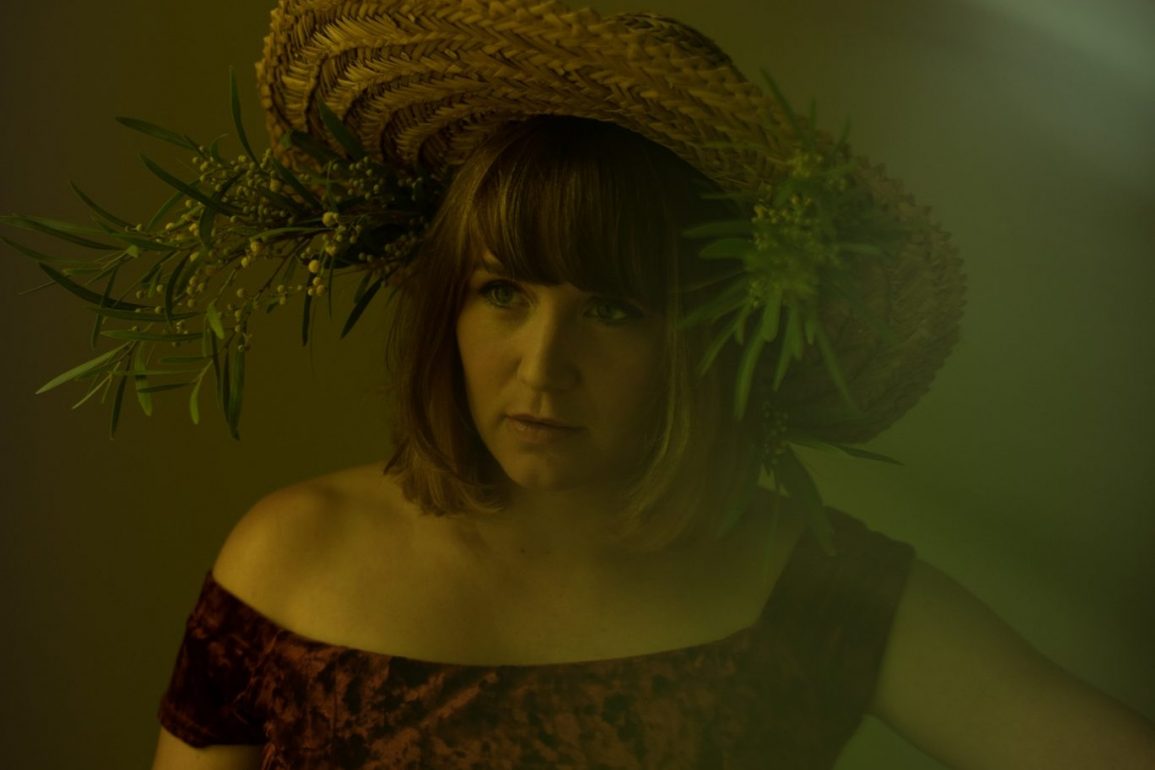Berlin-based Cherilyn MacNeil, who records and performs as Dear Reader, has certainly charted an interesting course in her budding musical career.
Most UK listeners were first introduced to the “art pop” stylings of South African-born MacNeil on Dear Reader’s 2013 Rivonia album, a brave effort that fused slick indie production and chamber pop sounds with textures of maskandi and afro-jazz, and which focused on the eponymous Johannesburg suburb and its history of apartheid and segregation.
Right from the outset, one gets the feeling that Dear Reader’s new album, Day Fever (out February 24th on City Slang), is an altogether different beast: a collection of mysterious, miasmic songs that combine heart-on-the-sleeve songwriting with a dynamic palette of ‘folktronica’ sounds and tape-based, rough-around-the-edges production techniques (courtesy of John Vanderslice, who has previously worked with The Mountain Goats and Spoon).
“It’s a beast in the deep/Making love to your ankles… There are eyes everywhere and I do not know/What do they see, and do they mean well?” wonders MacNeil on “Mean Well”, the album’s opening track, her vocals at once both theatrical and genuinely pained. The track’s gentle piano backing soon gives way to a flurry of electronic sounds, from programmed drums to dissonant synth bursts and modulated backing vocals, as MacNeil continues to lyrically chart a journey marked by contrast, incoherence and confusion.
It’s an avant garde, risky song, and it sets the tone for a highly ambitious album that will reward listeners who can appreciate Day Fever’s compositional quirkiness and maverick production flourishes.
We caught up with Dear Reader to learn about the new album’s musical and psychological influences, and its unique production process…
Hi there, how are you and what are you up to today?
Hey! I’m doing well thanks. Things have been very busy leading up to my record release on Friday [the 24th of February], so I’m feeling tired, but happy. Today I’m rehearsing with the band for our big release show in Berlin on Saturday.
How would you describe your sound?
I like the term art-pop, which I guess sums it up pretty well. It’s pop music, but a little arty. Some people also use the term chamber-pop, which makes sense because I like to use a lot of classical instruments (strings, horns, reed instruments). But, most of all, I like to work with voices. On the new album, Day Fever, I put together an 8-woman choir, so that’s a strong feature. We also used a lot of analog synths this time, and it has a much more open and raw sound. In general, I’d say my music is honest and heartfelt and slightly melodramatic. There’s a lot of light and shade.
Dear Reader began life in Johannesburg, South Africa. Why the move to Berlin?
In 2008 we signed to City Slang and started coming over to Europe a lot to play shows. South Africa is very isolated and far away from everything, and there’s not a very big market for what I do there, so when it became possible I applied for a visa and moved to Berlin. I’ve been here almost 7 years now, and I’m very happy here, although I do miss home.
As your career gets more and more established outside of South Africa, do you find that your connection to South African musical forms such as maskandi and jazz (so prevalent on Rivonia) is becoming diluted, or is it becoming stronger?
I do hear less South African music, that’s true. I have to purposefully seek it out now. I don’t feel like I’ve ever had a strong personal connection to those musical forms, but I do feel like South Africa has subconsciously invaded my musical language, and this mostly comes out in the form of rhythm. Not even necessarily in the percussion or drums, but also in the rhythm of the melodies I write. But, on the other hand, moving to Berlin has helped me to see South Africa from a fresh perspective, and has given me more clarity about my role as a white South African, historically and politically. It’s made me more mindful about everything to do with South Africa. So I think that’s been a good thing.
Tell us about the way your new album was produced. What was different in terms of studio approach this time around?
To make Day Fever I flew to San Francisco to record with John Vanderslice. He specialises in recording to tape, and we recorded the whole album in 10 days, usually doing only one take of every layer we recorded. I was way out of my comfort zone, and it was an extremely challenging experience, but it was also a lot of fun. I really had to let go, which does not come naturally to me. But the outcome is an album that has a very unique and raw sound. It lays everything bare. The experience of working with John has changed the way I think about making music – it was an antidote to my ruthless perfectionism. I don’t ever want to go back to making music where flawlessness is the goal.
The album deals with ‘heavy’ emotional themes such as grief, anxiety and depression. Do you find it easy to write plainly about these things? Has this record required bravery from you, in terms of the songwriting?
Writing the songs didn’t require bravery. They were simply the outpouring of how I was feeling. But putting them out into the world definitely does require a certain amount of courage. It’s hard to present your weakness in a world where everyone is working so hard to present their best selves. Our culture is obsessed with self-optimisation – “fitter, healthier, more productive” (to quote Radiohead). So it’s not easy to present this unflattering portrait of myself. But I do believe that a lot of people struggle with these things, and so perhaps people will be able to relate. And if not, so be it. For me the most important thing is to make authentic work, regardless of the consequences.
What is the title of the album meant to signal to listeners?
“Day fever” is an old term for hysteria. I guess if I had been alive and suffering from all of my neuroses in the 1800s, someone might have decided I’d be better off locked up in an attic. For the last few years while I was writing the album I spent a lot of time home alone, and for me it was not conducive to a healthy mind. But then in the evenings when my boyfriend came home, or when I was with friends, the veil would lift. So in some ways my anxiety and depression did feel like an illness that I suffered from in the daytime – hence the name.
What are the 5 albums that have influenced you the most?
Joni Mitchell, Greatest Hits
Laura Veirs, Saltbreakers
Paul Simon, Graceland
tUnE-yArDs, Whokill
Björk and Dirty Projectors, Mount Wittenberg Orca
Which other artists are you into at the moment and why?
I’m really into Bayonne’s album Primitives. It’s beautiful music, wistful but uplifting. It envelops you and immediately changes your mood. I’m also really into sir Was’s album Digging A Tunnel. It’s super vibey, and I love the hip-hop style beats.
What’s the best gig you have ever done and why?
We played a show with the Babelsberg Film Orchestra in Potsdam (near Berlin) in 2015. Of course it was amazing to play with an orchestra, but more than that, it is my favourite show because I experienced this moment where I stood on stage and felt completely at home. I felt in my bones that I was exactly where I was supposed to be.
And the worst?
Happily, it’s kind of hard to come up with a ‘worst gig’. I guess a stand-out low was a show I played about 10 years ago, before the time of Dear Reader, somewhere in Glasgow. I think 2 people came, so we played to them and the bar staff. That was pretty miserable.
If you weren’t a musician, what would you be?
I ponder this question about every second day and still have not managed to come up with an answer. I toy with the idea of moving to the country and growing vegetables and keeping chickens and goats. (But then who doesn’t?) I would love to work with plants…like maybe at the Botanical Gardens? I would also like to be a writer. Perhaps a poet. But like 150 years ago…
If you could perform alongside any other band or artist, living or dead, who would it be?
I would like to sing in harmony with Simon & Garfunkel.
How are you feeling about 2017? How do you think musicians will be affected by the general climate of uncertainty and upheaval being felt around the world?
Personally, I’m really excited about 2017. I can’t wait to put out my new music and go on tour. It’s been way too long. But in terms of the political climate, the rise of populism in Europe and the USA is very worrying. It has been cool to see how Trump’s election has mobilised people to get politically active in the States, and I think that is positive. In some ways, I think having an ‘evil’ to push back against is something people really crave. Especially us artists. But I think the biggest challenge is actually to try and bridge the gap between the left and the right, rather than increasing the polarisation. So we all need to figure out how to do that better. I must say that in general it’s feeling pretty hard to survive financially as a musician at the moment, and I guess a lot of young people in all of walks of life are feeling the pinch of that uncertainty. It would be sad if that meant that some artists stop making art. But sometimes adversity is also a helpful conduit…
Dear Reader’s Day Fever is out on February 24th through City Slang.



